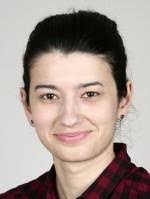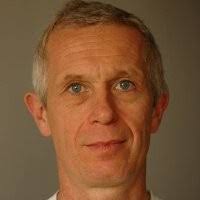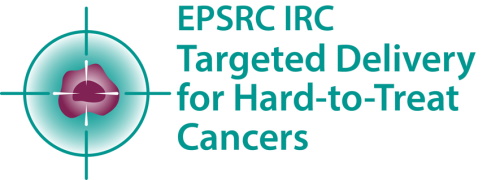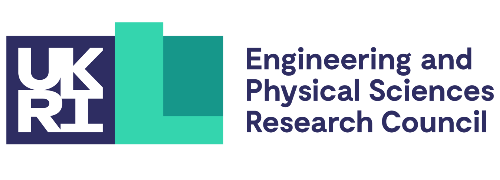Dr Voula Kasapidou
“The IRC and Aqdot have been really important to my career. On top of the experience at the University of Cambridge, Aqdot was the cherry on the cake”
I was a postdoc in the IRC from 2019 to 2022 as part of Professor Oren Scherman’s group in the Department of Chemistry at the University of Cambridge. My main focus was helping the translation work on supramolecular hydrogels as a new way to deliver anti-cancer drugs. The challenge was two-fold: to develop a robust scale-up protocol from small lab scale to gram scale, and to investigate terminal sterilisation methods for the final drug product hydrogel formulation.
In October 2021, I started a six-month placement with Aqdot funded by a BBSRC Flexible Talent Mobility Account postdoctoral placement grant. Professor Scherman, together with Professor Chris Abell, Dr Roger Coulston and Dr Jing Zhang, co-founded Aqdot in 2013 as a spinout from the University of Cambridge. Aqdot’s ambition is to become the world’s leading supramolecular company by developing applications for cucurbiturils (CBs). CBs act as ‘molecular containers’ or ‘supramolecular hosts’ that can encapsulate and protect active products in a range of applications.
The main objective was to transform the formulation of CB-based hydrogels from lab- to industrially-relevant scale, thereby taking the hydrogels closer to pharmaceutical industry Good Manufacturing Practice (GMP) requirements and the clinic. Aqdot was ideal for this because it gave us access to the facilities and expertise to build a robust scale-up protocol and gain insights into terminal sterilisation methods that are compatible with both a polymer in the hydrogel and a CB.
The placement was very successful. We transferred and reproduced the CB-based hydrogel process from synthesis of the raw materials to hydrogel formulation, and scaled up the different steps of the hydrogel process at Aqdot, initiating and facilitating the technology transfer process with a GMP manufacturer. In parallel, we also identified and implemented sterilisation methods for hydrogel components and potential cost savings.
Spending five months working between the IRC and Aqdot was an opportunity to gain valuable insights into preparing materials to GMP standards and associated protocols. I also learned how to carry out scientific experiments for scale up and formulation in an industrial setting. Moving from small-scale reactions to large-scale 5L reactors was an excellent opportunity to demonstrate the product’s scalability.
The placement had a major impact on me and the IRC. For the IRC, Aqdot’s training and equipment boosted the programme’s progress, paving the way for translation of hydrogel manufacture to an industrial setting. Working in industry gave me a deep understanding of manufacturing regulation processes in an industrial environment, preparing documentation to submit to regulators, and taught me about factors that are crucial in translating bench-top formulations to commercial reality. It gave me a unique experience of how industrial projects are managed.
The IRC and Aqdot have been really important to my career. On top of the experience at the University of Cambridge, Aqdot was the cherry on the cake! It has meant that my CV is extremely competitive, and helped me get my current position as a formulation scientist with Johnson & Johnson Innovative Medicine in Belgium. For me, it bridged a gap. In an academic environment we are more focused on building fundamental knowledge. Being in Aqdot allowed me to see how you turn a good idea into a final product for your targeted application. Colleagues at Aqdot were such open people and it was wonderful to be part of an open flow of ideas between industry and academia.
Dr Andrew Howe, Technology Leader, Aqdot
“Voula’s time with us was a great example of what can happen when commitment and time is invested in a project. Voula’s placement meant we could devote the resources necessary to take full advantage of a potentially groundbreaking opportunity”
Dr Andrew Howe, Technology Leader, Aqdot
Since the company was founded in 2013, Aqdot has been learning to make and find large scale markets for cucurbiturils. Aqdot now has its own manufacturing plant with capacity to make CB[n], a mixture of CB[6], CB[7] and CB[8] homologues, at a capacity of up to 5,000 tonnes per year. CBs are uniquely effective supramolecular ‘hosts’.
In this project, the CB[8] homologue is required. This is the largest of the common CBs and it can complex two aromatic chemical moieties (as ‘supramolecular guests’) in its cavity. If those moieties are attached to different molecules, the 2-guest-1-host complex provides a non-covalent link between those molecules. In this material, we use a very high MW polymer, ‘decorated’ with phenylaniline groups that act as guest moieties. The polymer molecules are very soluble in water and are present at a concentration where they interpenetrate. The CB[8] molecules provide multiple long-lived complexes between a polymer and its many neighbours. If the hydrogel is deformed, the phenylalanine groups detach from the complex allowing the gel to flow – no covalent bonds are broken. When the deformation stops, new complexes are formed and the gel-like properties return, ie the material effectively self-heals. This ability to flow then reform means that the supramolecular gel can be placed exactly where the surgeon chooses after removing the target tumour. The drug incorporated within the gel during its manufacture then releases slowly from the gel to the surface that was once adjacent to the tumour and prevents its regrowth.
To translate anything into use, ie to bring benefits to patients, the gels must be prepared at scales much larger than those at which they were first discovered and developed within the University of Cambridge. Aqdot makes CBs at multi-tonne scale, but for this application we were looking to move from lab scale to 5-20 grams CB[8]. The IRC is very multidisciplinary and multi skilled, and there is a vast range of expertise available at the University of Cambridge and other IRC partners. Aqdot was able to bring additional expertise and expectations to the IRC. I think this attitude and focus, as well as our equipment, made Aqdot a perfect partner for this placement.
Voula was admirably proactive, particularly in rising to the challenge associated with terminal ‘haracterizat’ of the hydrogel. Sterilisation can be an aggressive process – it is required to kill microorganisms, after all. In a system where the structural properties depend on use of very high MW polymers, such as these supramolecular hydrogels, even small amounts of molecular fracture can turn an exquisitely-tuned gel into a runny liquid, therefore solving the ‘haracterizat’ challenge was a great achievement by Voula.
At Aqdot, our manufacturing team is very good at putting together a project plan, meeting it and providing full documentation. In this case we met our goals on time – and they were challenging goals. As well as meeting the project aims, Aqdot learned a lot from Voula’s time with us. Everyone enjoyed working with her – she is a lovely person with a sunny disposition. Voula brought high academic standards and bought into the project’s focus. And she was able to take the findings back to the IRC, represent them in an appropriate way, and act as a focal point for liaison with the University. In addition, we loved having the challenge of rheological haracterization of the hydrogels, measurements that each of Voula’s advances required.
The placement was a great example of how universities can work with local industry where there is a good match between academic research and the translation required to bring those benefits to the wider world. Voula’s time with Aqdot demonstrated what can happen when commitment and time is invested in a project. The placement meant that Aqdot could devote the necessary resources to take full advantage of this potentially groundbreaking opportunity. From an industrial perspective, a successful placement depends on that person being a good scientist, and Voula certainly is that. She is interested, inquisitive, expert and determined, which brings out the best in all around her. Voula worked well with a range of Aqdot staff, especially Guilherme Nogueira, Aqdot’s Process Development & Technology Leader, who was essential in project planning, technical-report writing and finding quotations to estimate the costs of making the supramolecular hydrogel at GMP scale.




